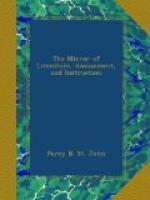he displayed for arithmetic, are well known; to the
last he was fond of figures, and was extremely clever
in making calculations; though very improvident in
his pecuniary affairs. The peculiar delicacy of
Mozart’s organization is displayed in the fine
sense of hearing which he evinced at a tender age.
Schachtner, a trumpeter, who used to visit his father,
had a violin that Wolfgang was fond of playing upon,
which he used to praise extremely for its soft tone,
calling it the “
butter fiddle.”
On one occasion, as the boy was amusing himself on
his own little violin, he said to Schachtner, “if
you have left your violin tuned as it was when I last
played upon it, it must be full half-a-quarter of a
note flatter than mine.” Those present
laughed at a nicety of distinction, upon which the
most critical ear could hardly pronounce; but the father,
who had many proofs of the extraordinary memory and
exquisite feeling of his son, sent for the instrument,
and it was found to be as the boy had said. Although
he daily gave fresh instances of his extraordinary
endowments, he did not become proud or conceited, but
was always an amiable and tractable child. The
affection and sweetness which characterize his airs
were inherent in his disposition, and the following
anecdote accounts for the prevalence of those delightful
qualities in his vein of melody:—“Mozart
loved his parents, particularly his father, so tenderly,
that every night before going to bed he used to sing
a little air that he had composed on purpose, his
father having placed him standing in a chair, and singing
the second to him. During the singing he often
kissed his father
on the top of the nose, (the
epicurism of childish fondness), and as soon as this
solemnity was over, he was laid in bed, perfectly contented
and happy.”
The young artist, in his eighth year, began to show
a manly intellect. It was in the third tour through
Germany to Paris, London. &c. that the fame of Mozart
extended throughout Europe; but as many particulars
of this period of his life are already known, from
the account published by Daines Barrington in the
Philosophical Transactions, the Letters of Baron Grimm,
and other sources, we shall only notice the newest
and most interesting incidents of this part of the
Biography. From Wasserburg, Leopold Mozart writes,
“We went up to the organ to amuse ourselves,
where I explained the pedals to Wolfgang. He began
instantly to make an attempt with them, pushed back
the stool and preluded standing, treading the bass
to his harmonies as if he had practised for months.”
The violin-playing of Nardini, whom the party heard
at Ludwigsberg, is much praised by Leopold Mozart
for the neatness of the execution, and the beauty
and equality of the tone. At Frankfort, Wolfgang
one morning on waking began to cry. His father
asked him the reason. He said he was so sorry
at not being able to see his friends Hagenaur, Wenzl,
Spitzeder, and Reibl. Though the children performed




